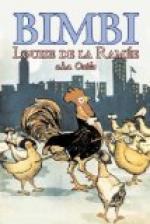True, people came continually to look at her, and especially in Maytime would cry aloud, “What a beautiful Niphetos!” But then she was bereaved of all her offspring, for, being of the race of Niphetos, they were precious, and one would go to die in an hour in a hot ballroom, and another to perish in a Sevres vase, where the china indeed was exquisite but the water was foul, and others went to be suffocated in the vicious gases of what the mortals call an opera box, and others were pressed to death behind hard diamonds in a woman’s bosom; in one way or another they each and all perished miserably. She herself also lost many of her once luxuriant leaves, and had a little scanty foliage, red-brown in summer, instead of the thick, dark-green clothing that she had worn when a rustic maiden. Not a day passed but the knife stabbed her; when the knife had nothing to take she was barren and chilly, for she had lost the happy power of looking beautiful all the year round, which once she had possessed.
One day came when she was taken up out of the ground and borne into a glass house, placed in a large pot, and lifted up on to a pedestal, and left in a delicious atmosphere, with patrician plants all around her with long Latin names, and strange, rare beauties of their own. She bore bud after bud in this crystal temple, and became a very crown of blossom; and her spirit grew so elated, and her vanity so supreme, that she ceased to remember she had ever been a simple Rosa Damascena, except that she was always saying to herself, “How great I am! how great I am!” which she might have noticed that those born ladies, the Devoniensis and the Louise de Savoie, never did. But she noticed nothing except her own beauty, which she could see in a mirror that was let into the opposite wall of the greenhouse. Her blossoms were many and all quite perfect, and no knife touched them; and though to be sure she was still very scantily clothed so far as foliage went, yet she was all the more fashionable for that, so what did it matter?
One day, when her beauty was at its fullest perfection, she heard all the flowers about her bending and whispering with rustling and murmuring, saying, “Who will be chosen? who will be chosen?”
Chosen for what? They did not talk much to her, because she was but a newcomer and a parvenue, but she gathered from them in a little time that there was to be a ball for a marriage festivity at the house to which the greenhouse was attached. Each flower wondered if it would be chosen to go to it. The azaleas knew they would go, because they were in their pink or rose ball-dresses all ready; but no one else was sure. The rose tree grew quite sick and faint with hope and fear. Unless she went, she felt that life was not worth the living. She had no idea what a ball might be, but she knew that it was another form of greatness, when she was all ready, too, and so beautiful!
The gardener came and sauntered down the glass house, glancing from one to another. The hearts of all beat high. The azaleas only never changed color: they were quite sure of themselves. Who could do without them in February?




